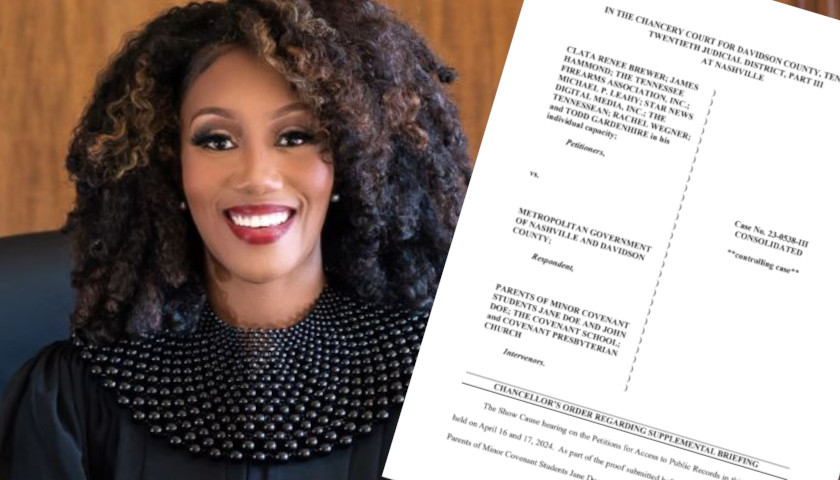Live from Music Row, Tuesday morning on The Tennessee Star Report with Michael Patrick Leahy – broadcast on Nashville’s Talk Radio 98.3 and 1510 WLAC weekdays from 5:00 a.m. to 8:00 a.m. – host Leahy welcomed Tennessee Firearm Association founder attorney John Harris to the newsmaker line to explain the Second Amendment implications of the retitled constitutional carry law, Beeler v Skrmetti.
Leahy: We are joined on our newsmaker line right now by our very good friend, founder, and executive director of the Tennessee Firearms Association, John Harris. A powerful group defending the Second Amendment here in the state of Tennessee for now, what is it, 30 years, John. How long have you been doing this?
Harris: Since 1995. We’re going on three decades.
Leahy: Wow, that’s so impressive. I don’t want to get too much into the weeds here, but this is an interesting case here that has some Second Amendment implications. And just to kind of set the stage, it’s about Tennessee’s constitutional carry law, that’s been called that.
And this was legislation filed in 2021 by Jack Johnson and William Lambert became law, but a lawsuit was filed, originally called Bassett v. Slatery. Slatery, of course, when he was the Tennessee Attorney General. He’s no longer the Attorney General.
We have a terrific new Attorney General, kind of a conservative superstar, in my view. Jonathan Skrmetti, appointed by the Tennessee Supreme Court. Been in office since September 1st.
He now is a named defendant in the case, and the plaintiff has been changed to Beeler. So the case is called Beeler v. Skrmetti. This is a federal court case in East Tennessee right now. Describe the issue in this case.
Harris: Sure. The issue in the case, and it actually applies to our permitting and permitless carry systems is that the Tennessee legislators that pass the bill decided that they would make 18 to 20-year-olds who have some type of military service, either currently in the military or honorably discharged, eligible for a permit in Tennessee or eligible under the permit less carry law.
But they decided, for reasons that make no sense, that 18 to 20-year-olds who do not have military service would not be eligible for the permit or for the permitless carry law. So there’s this distinction that some people can exercise their rights under the Second Amendment and some can’t, and it all relates to military service.
This lawsuit was filed in April 2021, right after the bill was enacted by some individuals who were in the age bracket of 18 to 20. And that’s why there’s been a name change. People got older saying that drawing that distinction with respect to a constitutionally protected right is an equal protection violation by the state and as a result is a civil rights violation under the U.S. Constitution. That’s the issue in the case.
Leahy: Now that makes sense to me, and frankly, it sounds to me and I guess TFA made this argument and you identified this problem with the legislation before it was passed into law. There were some legislators that would have made this apply to any 18-year-old, I suppose, but that didn’t pass.
Harris: That’s correct. There were legislators that actually even offered amendments that would have made this problem nonexistent but the leadership and the bill sponsors rejected it.
Leahy: Yes, that’s kind of interesting. I think you could see this lawsuit coming down the pike when you pass the law, couldn’t you?
Harris: Oh, yes. And more. This is just one issue, but there are several others that I can assure you are in the pipeline, particularly after the Supreme Court’s decision this year. Tell everybody about that Supreme Court decision.
Harris: The Supreme Court decision is a case that is referred to generally as Bruen, but the more proper name is New York State Rifle and Pistol Association versus Bruen, who was the U.S. Attorney General at the time. And that case, the Supreme Court, in a six to three majority, ruled that any state or federal law that imposes a restriction on gun owners or the right to own guns must be able to demonstrate that that category of restriction existed commonly in the 13 original colonies as of 1791.
And if that restriction doesn’t have a historical precedent or analog, then the Supreme Court said in Bruen the restriction is unconstitutional on its face. And that’s what is now really driving a lot of new litigation across the country, striking down both state and federal laws as unconstitutional.
Leahy: In this particular case, when it started Herb Slatery was the Attorney General. Now we’ve got Jonathan Skrmetti. Things have happened which gives you the indication that perhaps Jonathan Skrmetti, the new Attorney General has looked at the case and said, yes, there is an equal protection problem here. Tell us where the case stands right now.
Harris: Yes. Skrmetti is now the defendant, largely because of just the fact that he’s now the state attorney general. It was a procedural housekeeping change. It wasn’t anything that he did that caused him to be named the defendant other than accept the office.
Leahy: And the Attorney General’s job is to defend state laws, right?
Harris: Correct. Slatery and his office took the position and fought for over a year arguing that the lawsuit should be dismissed because there is no equal protection according to the violation. And what we have seen just recently in the last ten days or so is that an order has been signed by the court saying the case until the middle of January to give the parties an opportunity, because they asked for this, to submit an agreed order disposing of the case.
And as an attorney, I donate my time to the TFA, but I’m a practicing attorney in Nashville. As an attorney, an order like that indicates that some type of agreement has been reached between the plaintiff, which is backed by the Firearms Policy Coalition, the national group, and the state, on whether or not the merits of the lawsuit, the claim that it was an equal protection violation are either baseless or valid.
And my anticipation, just as an attorney looking at the structure of the case and the change of direction, is that we may be seeing an order come down within the next 30 days agreeing that the state law that these legislators proposed and push through.
And in particular, the regional rejection of the concern that there was an equal protection violation is in fact accurate. And the state may concede that the 2021 law is unconstitutional.
Listen to today’s show highlights, including this interview:
– – –
Tune in weekdays from 5:00 – 8:00 a.m. to The Tennessee Star Report with Michael Patrick Leahy on Talk Radio 98.3 FM WLAC 1510. Listen online at iHeart Radio.
Photo “John Harris” by NewsChannel 5. Background Photo “Gun Show” by M&R Glasgow. CC BY 2.0.








